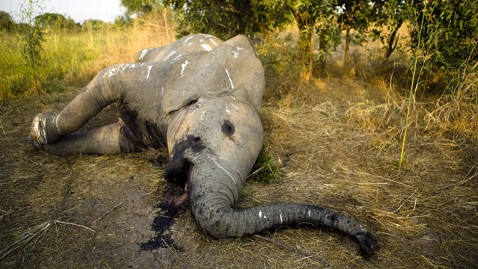11,000 Elephants Poached, Group Says
Poachers seeking ivory tusks have killed and mutilated 11,000 elephants at just one national park in Africa since 2004, a conservation group said today.
"This is a shocking number," said Dr. James Deutsch, director of the Africa program for the Wildlife Conservation Society. "This is, by far, the biggest killing of forest elephants in Africa."
Forest elephants, unlike their savannah-dwelling counterparts in southern and eastern Africa, live mostly in the Congo rainforests in the western part of the continent.
Conservationists estimate there are about 100,000 forest elephants left. The largest population, about 22,000 animals when they were counted in 2004, lives in Gabon's Minkebe Park.

(Jeff Hutchens/Getty Images)
In the last five years, the Wildlife Conservation Society estimates that two-thirds of the park's elephant population has been killed by ivory poachers.
The amount of elephant poaching worldwide is at its worst level since 1989, according to CITES, or the Convention on International Trade in Endangered Species of Wild Fauna and Flora.
In 2011, CITES reported there were 14 large seizures of illegal ivory, totaling more than 24 tons. Much of the illegal ivory was destined for China and Thailand, CITES said.
Several factors are responsible for the jump in elephant deaths in Gabon, Deutsch said, including the park's shared border with the poorer country of Cameroon and the presence of a large, mostly illegal gold mining operation that allowed poaching to thrive.
The conservation community also shares part of the blame, Deutsch told ABC News.
"The conservation community, including the national park service, the government of Gabon and all of us were not doing our jobs well in watching out for what was going on," Deutsch said. "That was all against the backdrop of the very rapidly escalating price in ivory in China, and the huge increase in poaching across Africa and illegal export to China."
The ivory from forest elephants is actually preferred over ivory from savannah elephants for some uses, Deutsch said, including ceremonial music picks used in Japan.
"It's a little bit harder and slightly yellower, and some dealers prefer the forest ivory," Deutsch said.
The Wildlife Conservation Society has been working with the government of Gabon, among others, to deal with poaching by organized crime syndicates, Deutsch said.
"The government of Gabon has taken this tremendously seriously and does seem to be doing what's necessary to try to get it under control," he said.